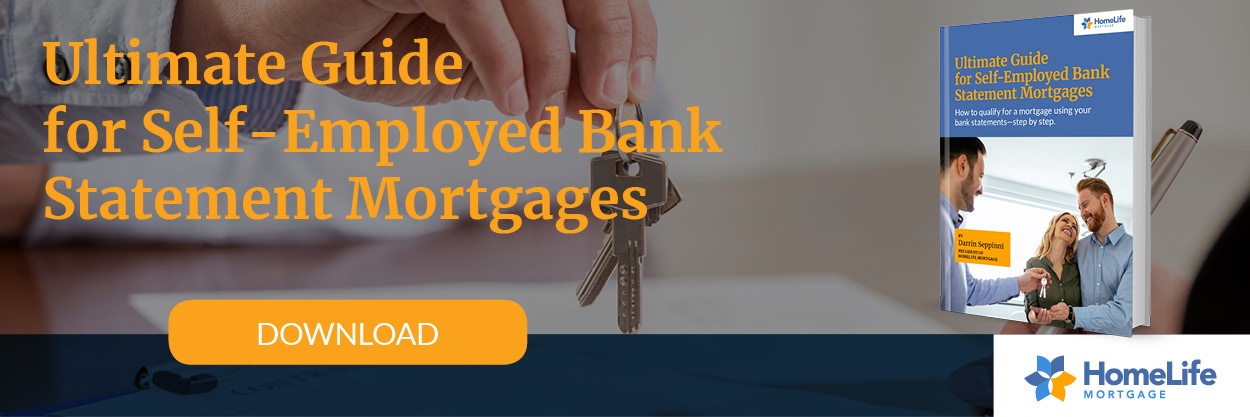Bank Statement Mortgage Interest Rates Designed for the Self-Employed
If you’re self-employed, an entrepreneur, or a freelancer, then a bank statement loan can be a smart way to buy a home.
Not only do these loans let you qualify based on proven trends in cash flow (not W-2s, tax returns, or paystubs), but they’re also flexible on eligibility requirements — things like credit score, down payment, and cash reserves.
Still, qualifying is just one part of the puzzle. If you want a mortgage you can afford, you also need to secure a lower interest rate when you do.
Want to make sure you get the best rate when applying for your bank statement mortgage? Here are the main factors that will come into play:
1. Credit score
The better your credit score is, the lower your interest rate will usually be. So if your score is on the lower end (think mid 600s or under), then you might work on improving it before applying for your loan.
A few things to note: Mortgage lenders usually pull scores from all three credit bureaus, and then use the middle score when evaluating your risk as a borrower. If you’re applying with a spouse, they’ll take the lower of your two middle scores.
In some cases, there’s a chance your lender will let you use the score of the “primary” income earner, but you’ll have to provide documentation showing who that earner is. To be safe, make sure you know what score your lender will use, and if it’s the lower of the two, think twice about applying for your loan with a spouse. At the very least, pull their credit score first, as a low score could hurt your chances at a good rate. (In this case, you’d only want to include your spouse if you absolutely need their income to qualify for the loan.)
2. Down payment
Your credit score will impact what down payment you’ll need, as well as your interest rate. Generally, the lower your score is, the more you’ll need to put down (this lowers the risk for the lender).
For example, a 660 credit score would require at least a 15% down payment. If your score is in the 700s? You’d need a much smaller down payment.
Keep in mind though, regardless of score, a larger down payment can never hurt. When you put more down, it reduces how much your lender has to loan you, thus reducing the risk they take on as well. And the less risky your loan is? The better your interest rate will be.
3. Loan-to-Value Ratio
The LTV — or loan-to-value ratio of your mortgage — will also impact what rate you get on your loan. To calculate your LTV, you take your loan amount (how much you’re borrowing for the house) and divide it by the home’s value.
So, if your loan is $200,000 and the home is worth $250,000, your LTV is 80% (200,000 / 250,000). Lower LTVs will typically qualify for the lowest rates. Additionally, you’ll usually need an 80% LTV or lower if you’re looking for a cash-out refinance.
Other factors that could impact your rate
There are some other factors that lenders consider when determining your rate as well.
These include things like:- The type of loan: Cash-out refinances usually have higher interest rates than traditional ones. Shorter-term loans will usually have lower ones.
- Interest-only options: If you opt for a loan that allows you to pay only interest for the first few years of the loan (a good idea if you don’t plan to be in the home long), then you’ll usually pay a higher rate to do so.
- Loan amount: Larger loan amounts often come with higher interest rates than those under this threshold, as they’re riskier for the mortgage lender.
- Property type: You’ll usually get the best interest rates on primary residences. If you’re buying a second home, vacation house, or investment property, you can expect rates to be slightly higher.
Getting preapproved for your loan can help you gauge what interest rate you can expect — as well as determine an appropriate price range to shop in. Ready to get preapproved for your bank statement loan? Reach out to Homelife Mortgage today.
Need a bank statement loan?
If you’re considering buying a home but aren’t sure you’ll have the documents necessary for a traditional loan, then a bank statement mortgage could be for you. Get in touch today to learn more about these mortgages or to get prequalified.
Ready to Get Started?
If you think you're ready for a Jumbo Bank Statement Loan of your own, learn more about how to qualify by downloading our free eBook, The Ultimate Guide for Self-Employed Bank Statement Mortgages.
More Content For You:
Why Bank Statement Loans for Buying a Home are on the Rise
Rates for Bank Statement Mortgage Loans for Refinancing
Self-Employed Mortgage: Buy a Home With a Bank Statement Mortgage
Questions?
Click the live chat window on our site or call (888) 677-2526. Our team is ready to assist you!
About HomeLife Mortgage
For more than 25 years, HomeLife Mortgage has built a strong reputation in California and Florida as a leading mortgage broker, servicing the needs of borrowers who have been unable to obtain conventional financing. HomeLife Mortgage is at the forefront of non-bank lending offering the next generation of mortgages including Jumbo Loans, Real Estate Investor Loans, and Bank Statement Loans.

.jpg)





